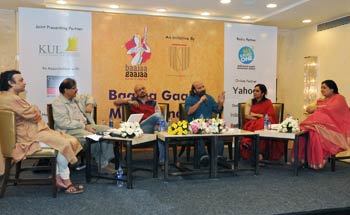PUNE: 72% of music sales in India is by film music and bollywood industry is the prime contributor of the popular musical culture. As a nation of deep and diverse musical forms, Indian media industry should ignore profits sometimes and understand the importance of spreading awareness about our rich musical heritage. Indian music composers are like general petitioners, they have to be experts and conversant with all kinds of music in the world. Now-a-days it is just not composing a soulful melody, but there are many factors like ringtones and the role of actors in a song that have to kept in my mind before composing.
These were the key discussions brought out in the ‘Film Music: The Composer’s Perspective’ session moderated by author Sudha Menon on day two of ‘Baajaa Gaajaa Music Conclave’, held on 11- 12 Feb 2012 at Vivanta by Taj – Blue Diamond in Pune. The panelists were music composers Debojyoti Mishra, Shantanu Moitra and Tushar Bhatia, who were accompanied by festival curators’ singer Shubha Mudgal and tabla maestro Aneesh Pradhan.
Throwing light on the current scenario of music composition in films, the session focused primarily on the plight, rewards and experiences of music directors while composing for films. Sharing his experiences Moitra said, “I still call myself an amateur musician and according to me film music composition today is a ‘Khichdi Art’ –Yha Sab Kuch Chalta Hain.” People don’t talk about film scores which is very crucial for defining the creativity of musical art form. Today, film composers require only one hit song to be successful.
In the last 15 years, usage of songs in films has drastically changed. From an album of eight songs, only two songs are marketed heavily to promote the film. The true melodies of Hindi films from the past have lost because today film directors want the song to be hummed by audiences. The songs are created using simple words, languages and according to the comfort of the listeners. “We are dumping down musical craft for the audience, as they should be able to render the song easily. If the people cannot sing it, then it’s considered a bad song,” shared Moitra.
For youths today, there is not a single radio channel where they can hear different genres of music than the TOP20 bollywood chartbusters. There is also a certain kind of peer pressure among the young about being treated different if they listen to non-film music.
Mishra added, “It’s true that melody is lost somewhere but I know that a good song still haunts a 18 year old. Music is very important in our country and Indian composers today have to be conversant with all kinds of music in the world like western, blues, jazz, folk etc.
Taking the session further, Bhatia noted that using only a section of the song and not the complete music composition has become a trend today. He said, “There was a situation where I was told that that the end lines of the song should be great, irrespective of whatever may be the first half of the song.” A composer has to go through a lot of churning around with the director, producer and other team members before the final composition.
There are a few producers, directors who let the composers do their art and give them the freedom to produce their creativity, but the composers are always a subject to time restrictions.
Gliding towards Indian music Pradhan brought out a fact that time constraints and sections are not only limited to film music, but this is applicable with Hindustani music also. Musicians are looking at only sections of the song that would hook the audiences, irrespective about breaking down on melodies and rhythm. It has become a trend, and there are many musicians who also decide and plan everything like which beat to play at what time, before a live music concert.
The session concluded bringing out a fact that music composition is a very specialized job and not everyone can do it. Sometimes it is difficult for music composers to deal with stern film directors but if they are grounded well with music then it’s like esthetically weaving their thought and music into cinema. As a nation we have to understand that there is a need to create awareness about Indian music. The media industry should step outside the boots of profits and loss, and sometimes also think about the diversity of Indian music. There has to be exchange in format for composers to experiment and diversify in their approach. Younger generation is accepting the different kind of music, but the perception created of not using traditional music in films has to be changed.
